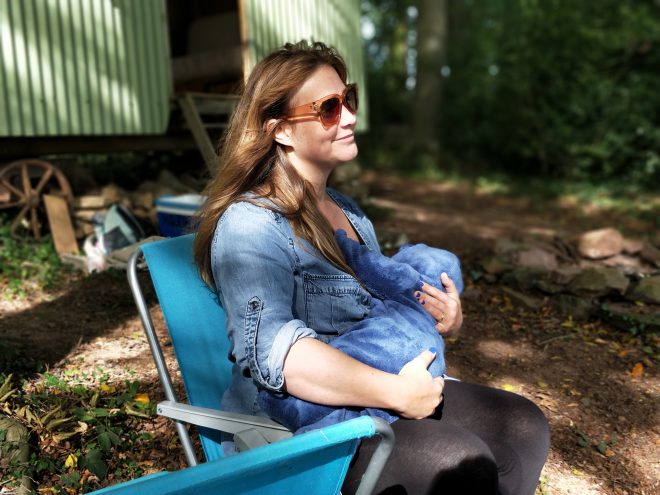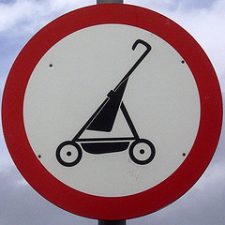 A common misconception about breastfeeding and babies in general is that they require special equipment. But we already know on Green Prophet that a mom who buys less is by default acting in an environmentally-friendly way.
A common misconception about breastfeeding and babies in general is that they require special equipment. But we already know on Green Prophet that a mom who buys less is by default acting in an environmentally-friendly way.
So what are the essentials, and what aren’t? A lactation specialist offers you this guide to making breastfeeding truly green. Products you don’t buy, won’t have to be manufactured, packaged, transported, cleaned, or disposed:
1. No Formula. Parents are often advised to keep formula on hand “just in case.” But they are more likely to offer formula to a newborn when they have it in the house, which is why formula companies give out free samples. The first time baby won’t settle down, usually in the middle of the night, parents worry (understandably) that he is hungry and offer him a bottle.
But babies cry for many reasons, and parents need to know the signs that the baby is getting enough milk. Giving a bottle in the early weeks exposes the baby to infection and can interfere with the baby’s natural immune system.
If a supplement is truly needed, the first choice is the mother’s own milk. And once babies are eating a variety of nutritious solid foods, formula (made from cow’s milk) doesn’t offer anything extra. It’s expensive, highly processed and overly sweet.

2. No Bottles. The cultural association of babies with bottles is deeply ingrained. In some cultures, dolls come with a breast tied on a string (but children who grow up with breastfed siblings simply put the doll to their chest). Babies can drink from a cup from about six months of age.
Mothers who plan to be separated from a young baby will want the convenience of bottles, although a cup or spoon will do in a pinch. Water bottles are not necessary for breastfed babies on even the hottest days. Instead, nurse baby a little more often and check that urine is clear and plentiful.
3. Avoid nipple creams. The breast’s surface is perfectly suited for baby, and need be washed only with water. Lanolin creams only soothe and don’t cure pain caused by a bad latch, and some creams can cause an allergic reaction.
Pain should always be evaluated because a bad latch can lead to poor milk transfer and low weight gain. Medicinal creams, when prescribed to treat specific conditions like thrush or eczema, should be applied after feedings and do not need to be washed off.
4. Disposable breast pads. It’s better to use reusable cotton pads for the early weeks and months when breasts may leak. A folded handkerchief who can later wash works too. If you have extra masks on hand from coronavirus, or COVID-19 that are unused, then stuff them with extra padding, use, wash, repeat.
5. No need for pumps. Unfortunately, pumps have made it onto the list of necessary baby items. Some babies whose mothers return to work after six months may do fine with solid foods and a cup at the babysitter, nursing the rest of the time.
(Mothers who pump at work usually continue until age nine to twelve months.) For short outings hand expression is free and works as well as or better than a pump, with a little practice.
Some working mothers even prefer hand-expression, but it does require privacy.
Good quality pumps don’t have to be purchased new. They can be borrowed from places like Yad Sarah (an organization in Israel that distributes medical equipment) or rented from a lactation consultant. See what’s local to you.
Other types of pumps are difficult to sterilize and may not last through two babies. Try bringing baby along– in Israel, babies are welcomed almost everywhere and a lucky few moms have even managed to bring baby to work.
6. No vitamins and drops. Concoctions for increasing milk are overrated–the way to ensure enough is to nurse often and effectively. Analysis of the milk of mothers from different cultures, diets and socioeconomic levels has shown little difference in quality or quantity. Unless you are in some places where environmental toxins in breastmilk are high like in Tunisia.
A mother’s diet, unless extremely deficient over several years, has almost no effect on her milk. Mothers, like everyone else, should care for themselves by eating well and setting the stage for healthy eating as children grow.
Regarding drops for babies, the American Academy of Pediatrics (AAP) recommends:
In the first 6 months, water, juice, and other foods are generally unnecessary for breastfed infants. Vitamin D and iron may need to be given before 6 months of age in selected groups of infants (vitamin D for infants whose mothers are vitamin D-deficient or those infants not exposed to adequate sunlight; iron for those who have low iron stores or anemia).
7. No Powdered cereals, teething biscuits, and jarred baby foods. “Baby” foods became popular with the advent of artificial feeding, when solids were introduced before babies were developmentally ready.
But after six months of exclusive breastfeeding, as recommended by the AAP and Israel’s health ministry, babies can eat soft table foods mashed with a fork and graduate to finger foods shortly afterward.
8. No need for special nursing clothes and bras. Wear a loose t-shirt that you can pull up — the baby covers your torso. Try a button down shirt on top of a tank top, or slash holes in a t-shirt and wear a loose shirt on top. You can experiment with regular and sports bras (or none–bras don’t prevent sagging, which is caused by pregnancy), but one that is too restrictive can lead to plugged ducts and infections.
9. No need for contraceptives and feminine hygiene products. Some people believe that you can’t get pregnant while nursing, while others insist it doesn’t make a difference. The truth lies somewhere in between. Mothers can learn which factors delay the return of periods, and when and when not to rely on breastfeeding for birth control.
10. No need for breastfeeding pillows. They’re hard to transport, and it’s usually more effective for the mother to support the baby’s weight herself. In the beginning a regular pillow can support her arms and raise the baby to the height of the breast.
The one item I do recommend purchasing, second-hand if possible, is a good quality sling or baby carrier. Mothers get used to carrying babies’ weight as they grow and it’s great exercise. Carriers keep babies calm and eliminate the need for shlepping a bulky stroller to the mall (not that you need anything) or beach.
Consider carefully before buying–your baby needs your loving arms more than any accessory.
For more on breastfeeding:
Breastfeeding and Judaism: Why Moses’ Mother Didn’t Put Bottles into the Ark of Bulrushes
Why Baby’s First Gift Shouldn’t Be Formula From the Hospital
10 Common Misconceptions about Breastfeeding Your Baby




While it is certainly not necessary, I used my breastfriend pillow constantly for about 5 months, it saved my back, I know because i didnt get it immediately. It made it much easier to nurse, and more comfortable for me when arm rests or foot stools etc werent available. Its was so comfortable, I had no issue letting my daughter nurse for comfort, which is great for supply. I bought a 2nd one, used and handed it down to another mom as a way to support her breastfeeding relationship.
I just read in a breastfeeding textbook (Riordan, 2010) that beer does increase prolactin levels. Higher prolactin levels don’t always translate to higher supply, but it doesn’t hurt.
Thanks so much Varda! As far as I know, research has not supported the idea that malt/brewer’s yeast increases milk supply.
A very comprehensive article. As a mother of 12 who nursed all 12, I can say that for me, a comfortable chair for nursing was a must, as was my afternoon bottle of malt and sometimes regular beer. I needed the B vitamins, or maybe it was just psychological, but the beer really helped.
I think you just needed the beer, with 12! 🙂
Just came and read, this is wow! I was seek from many blogs, but here is the best, I love it.
delayed period while breastfeeding is “normal” as I've read…
delayed period while breastfeeding is “normal” as I've read…
Thanks, Tamar, I’m glad you decided to comment.
I’m not necessarily recommending against these items. All of them have been useful for some mothers at one time or another. as your experience shows. My point is that mothers think twice before buying something they may not need—there is a lot of pressure to buy stuff that turns out to be unnecessary.
Hi, this is my first comment on Green Prophet, so just wanted to begin by saying I’m glad you hevre are doing what you’re doing!
I’m a big proponent of breastfeeding and am currently nursing my toddler. I’m also big on not falling into the trap of buying lots of unnecessary items, for babies or otherwise. However, a few of the items you recommend against, I personally found really helpful in the intense early months of nursing. For instance, I tried to give ordinary pillows a chance, but I was so uncomfortable and my baby was the all-day, all-night comforter nurser type. So I tried a nursing pillow, borrowed from a friend, and it made a world of a difference. I also found lanolin cream to be very helpful in the beginning. Definitely, these items aren’t necessary but they were a great help. Maybe try without first, but keep them in mind.